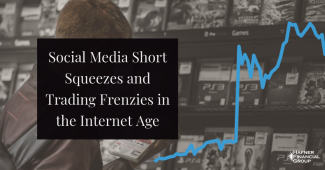
Social Media Short Squeezes and Trading Frenzies in the Internet Age
The effects of the drastic rise of social media in our everyday lives are no doubt widespread. Examinations into the way we present ourselves and the way we perceive others in an online landscape have been the subject of numerous sociological and psychological studies and speculations both praising its value of interconnectivity and during its more negative aspects. The use of at least one form of social media by everyone with an internet connection has made it a welcoming landscape for anyone looking to make it big as an online influencer or marketer with a keen eye for taking advantage of the numerous algorithmic quirks of popular websites. The vast sums of money that can seemingly be obtained relatively instantly aren’t just sought after by online advertisers and influencers but a new rise in DIY stock trading and coordinated social media investment strategies has gotten everyone talking after the unexpected rise and sudden plunge of GameStop’s stock price. Just what are the real economic effects of these online short squeezes and what will it mean for the future of Wallstreet and stock trading?
Betting against GameStop’s stock value made perfect for numerous hedge funds looking to short sell. A mixture of a declining business model and the Covid-19 pandemic bringing little traffic into the remaining store locations spelled disaster for the company’s future survival. Numerous firms began shorting the stock they had purchased in the retail chain confident in their decision. The short squeeze while completely unexpected by many was perfectly predictable with enough hindsight. The mixture of social media led stock strategies like those found on Reddit’s R/Wallstreetbets forum and the freely available information online about the stock market created a perfect storm for the squeeze. After firms shorted the stock many forum users began buying up the stock in bulk driving up the value once again. Needing to meet the necessary returns on their portfolios firms had no choice but to rebuy the stock they had just shorted thus causing the squeeze. As more and more people began jumping on the bandwagon and firms not wanting to lose money began to invest the stock value began inflating more and more eventually reaching a value over $450 at its peak before plummeting down to just over $60.
Although the anomaly of a short squeeze is nothing out of the ordinary for trading what was unexpected was its cause. The GameStop short squeeze is more than likely just the first gust of wind in a phenomenon that will only rise as more and more people begin to trade online and strategies are explored across various online forums. An obvious question begins to appear after such huge gains and losses were made by those betting on GameStop, what are the ultimate effects these bets have on the economy, and what will the future hold for online trading? The clearest economic effect this social media-led short squeeze had was the ability for firms to generate the necessary capital to continue to grow. Even though individual investors who were able to generate hefty profits seemingly out of nothing is a promising prospect for anyone unable to take advantage of a hedge fund, large firms unable to generate their own profits have their own share of economic downsides.
While some merely view shorting stocks and betting on stock value as mere gambling with market forces it’s a subject of widespread debate as to whether these shorts and short squeezes have an effect on a company’s brand image and future survival which carries its own economic effect on those who work there or value its goods and services. The recent restrictions Robinhood placed on stock purchasing as well as calls for online stock trading and regulations are just the first signs of the phenomenon that has been observed across other forms of social media already. Because the widespread use of social media is so new, we are bound to see major controversies arise and calls for regulation to occur. An analogy can perhaps be made to the recent restrictions sites like Facebook, Twitter, and Youtube have made to what users can say and post with the rise of fake news and targeted harassment campaigns. Thus it makes sense that eventually calls for regulation would spill into online commerce and market speculation just as they have been called for with every new technology that arises. The GameStop short squeeze was a rallying cry for many looking to make a quick fortune online. However, the rallying cry could quickly turn into a siren’s call as new traders with little experience could lose more than they bargained for betting on the wrong stock. Just as we usually only see the best moments of other people’s lives in a carefully crafted social media timeline, it can be tempting to jump on a strategy of someone who only ever reports their gains and never their losses, but it’s when we share in the losses that we feel the true squeeze.
*This content is developed from sources believed to be providing accurate information. The information provided is not written or intended as tax or legal advice and may not be relied on for purposes of avoiding any Federal tax penalties. Individuals are encouraged to seek advice from their own tax or legal counsel. Individuals involved in the estate planning process should work with an estate planning team, including their own personal legal or tax counsel. Neither the information presented nor any opinion expressed constitutes a representation by us of a specific investment or the purchase or sale of any securities. Asset allocation and diversification do not ensure a profit or protect against loss in declining markets. This material was developed and produced by Advisor Websites to provide information on a topic that may be of interest. Copyright 2021 Advisor Websites.

